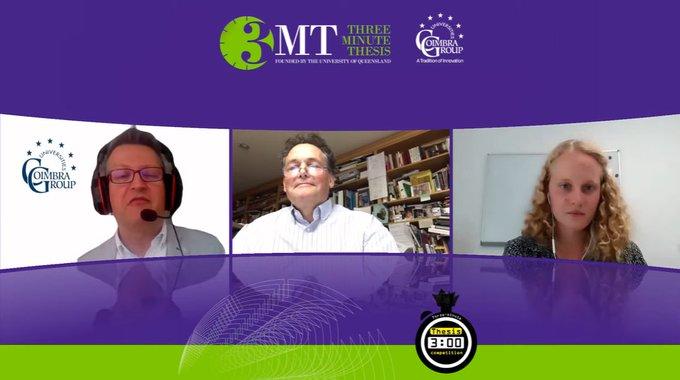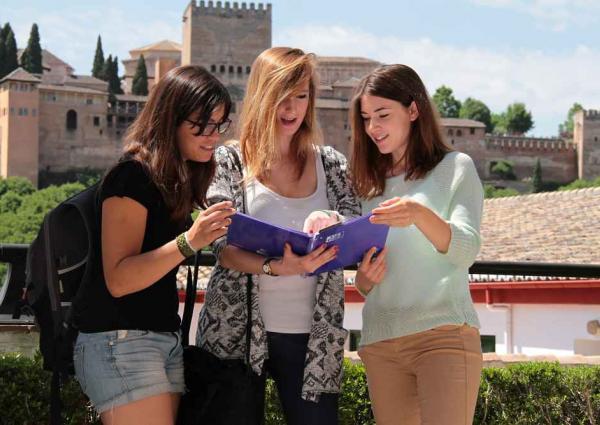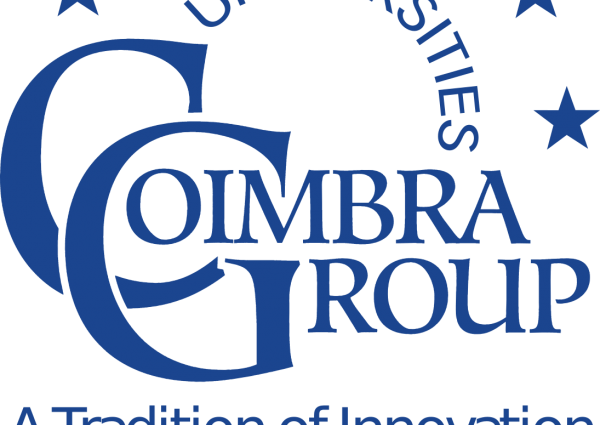15th Arenberg-Coimbra Group Prize Award, Zoom
back to the overview
The Selection Committee established by the Executive Board for the 2021 Arenberg-Coimbra Group Prize for Erasmus Students is pleased to unanimously nominate Ms Katharina Wenderott from the University of Göttingen (Germany) for this year’s award.
Ms Katharina Wenderott spent her 5-month Erasmus exchange at the University of Granada in Spain in the academic year 2018-2019. In August 2020 she obtained a Master’s degree with distinction in Psychology from the University of Göttingen.
In her application Ms Katharina Wenderott has very well described the multidimensional experiences and benefits of her Erasmus stay. She has articulated clearly about the transformative impact of the new pedagogical settings she got to know during her studies at the University of Granada: group projects, work in multicultural teams, inspirational young women as lecturers who she now sees as role models, etc.
Ms Katharina Wenderott has shown that the value of the Erasmus experience is particularly significant for expanding research interests, reaching academic excellence as well as for gaining linguistic and intercultural skills. During her studies in Spain, she voluntarily selected academic subjects that were not offered at her home university such as community psychology and health psychology. This has eventually led her to write her master’s thesis on the job demands of nurses and particularly the stress that they are exposed to. Such topic has become increasingly relevant in the context of the Covid-19 pandemic.
While studying in Granada, Ms Katharina Wenderott completed a B2.1 Spanish course and joined the local scout group as a volunteer for full immersion. At the time of her nomination to the Arenberg-Coimbra Group Prize, she was volunteering for three months at the World Centre of the World Organisation of the Scout Movement (WOSM) in Kandersteg, Switzerland, while also preparing applications for PhD studies in a field of research that is directly inspiring from her academic experience at the University of Granada: the mental health of people interacting with new technological systems.
The Selection Committee would like to congratulate Ms Katharina Wenderott on this year’s Arenberg-Coimbra Group Prize and wish her a successful career based on her European educational experience.
We should also like to commend the other nominees; the standard was very high and their testimonials also provided excellent examples of the impact of their mobility experience and academic qualities. We are pleased to recognise also the commitment to the Erasmus project of the Coimbra Group Universities where they were awarded their degrees and undertook their exchange periods of study.
Speech by Leopold, Duc d'Arenberg
Ladies and Gentlemen, dear rectors, professors and students of the Coimbra Group, dear representatives of the European Commission, Mesdames et Messieurs, meine Damen und Herren, geachte dames en heren,
Thank you for being with us today as we are awarding the 2021 Arenberg-Coimbra Group Prize, which recognizes the academic value of the Erasmus student exchanges.
2021 is, again, a very special year for all of us as well since the pandemic is still going on.
As I said last year, if we look back in time, we realize that everything is possible, that nothing is ever granted, that life is a never ending movement for the better or for the worse. The withdrawal of the UK government from the Erasmus programme while setting up a mobility programme for UK students only – that is, without any financial support for the reciprocity of exchange – is a perfect example of the ‘black swan theory’ and a lost opportunity for future generations of students.
This is why the Arenberg Foundation promotes History, the summary of all human knowledge, to give us some psychological and emotional stability at a time where the pandemic has become an “infodemic”, the bad news generally prevailing over the good news.
Four interesting developments took place in the last twelve months:
- We all took notice that breathtaking inventions were made in the medical sector thanks to the mRNA technology and that the vaccines developed by Biontech and Moderna have already saved millions of lives. In fact, we may be at the beginning of a new area in the field of medicine, although many of us don’t realize it yet. What is sure though, is that these new technologies wouldn’t have been made possible without risk taking entrepreneurs who managed to convince venture capitalists “to bet the farm” on this new technology for more than ten years at a loss, one more proof that we have to give as much freedom as possible to true entrepreneurship and nurture it in our European universities.
- The European commission has become more powerful, as the European governments did not only task her with coordinating the vaccination programme at the European level but accepted, for the first time, the idea of European loans, a concept that could be used at a later stage for a European Defence Community with a pan-European defence force, something that had already been tried but rejected by the French parliament in 1954.
- All of us have learned to work from home with great success and we all hope that we will not go back to “normal” after the pandemic, meaning that homeworking will be an option for all of us, may be one or two days a week, something that would help fight climate change and prevent us losing our time, temper and health in horrible traffic jams or railroad delays.
- Thanks to the Big Tech and their increased influence over the course of the pandemic, the so-called “Woke” and “Cancel Cultures” have spread from the USA to Europe. It remains to be seen if the European universities are going to manage to preserve their intellectual independence and to keep on fostering a culture of real debate, the essence of the word “university”.
Our Arenberg Coimbra Group Prize for Erasmus students has been awarded every year since 2007, the first time being in Turku (Finland) almost 15 years from now, and much before any other international recognition of Erasmus activities.
This reveals the great importance that both the Arenberg Foundation and the Coimbra Group place in the physical mobility of students and researchers within Europe.
Indeed these Erasmus mobilities play a crucial role in strengthening the European integration and identity from the bottom-up.
While we hear a lot about virtual mobility, we know in the deep down that nothing replaces the face-to-face contact, the shortest distance between two people being a smile. This shall encourage us to continue enhancing and promoting the circulation of students and researchers within Europe, which, as our laureate Katharina Wenderott demonstrates this year, provides an essential contribution to the advancement, excellence and cross-fertilisation of academic work.
La Fondation d’Arenberg fait la promotion de l’Histoire et de la Culture dans un esprit résolument européen à partir de la ville belge d’Enghien/Edingen in het Nederlands waar nederlandstalige mensen altijd welkom zijn.
Nous mettons un grand fonds d’archives familial à disposition des chercheurs qui viennent de toute l’Europe. Nous organisons des concerts, des conférences, des séminaires, des rallyes automobiles culturels ; nous organisons aussi ou participons à des expositions comme par exemple celles qui se tiendront à Beaune (en France) et à Essen (en Allemagne).
Nous attribuons différents prix, à savoir deux prix d’Histoire tous les deux ans, ensuite le prix Arenberg-Coimbra Group qui encourage la mobilité estudiantine entre les universités européennes du Coimbra Group dans le cadre du programme Erasmus, et enfin le prix Collège de l’Europe Arenberg par lequel nous récompensons des travaux qui étudient les mécanismes permettant aux peuples de vivre ensemble, à la fois dans le vrai respect de leurs différences et dans un esprit d’union européen. Estamos en discusiones con una reconocida universidad espanola para crear un nuevo y quinto premio que recompensará los proyectos relacionados con problemas jurídicos en un marco europeo común de referencias.
Nous publions - ou contribuons également à publier - des livres, plus d’une trentaine à ce jour.
En 2020, nous avons publié quatre ouvrages, et cette année, nous allons en publier deux ou trois. Unter anderem eine Geschichte der Grafschaft Blankenheim und des Herzogtums Arenberg als Nachbarn bis zur französischen Revolution.
Wir gratulieren sehr herzlich Dr. Peter Neu der es geschafft hat dieses ehrgeizige Projekt in kurzer Zeit zu einem guten Ende zu bringen. D‘autres projets d’ouvrages sont dans le pipeline, notamment un livre intitulé « Women warriors » consacré aux femmes soldats de l’armée américaines qui ont été blessées au combat en Afghanistan et en Irak, deux livres consacrés aux papes, un livre sur la correspondance entre Mirabeau et le comte de La Marck, né Auguste d’Arenberg, un livre sur la mode à la Renaissance.
Si nous nous donnons autant de peine pour contribuer modestement à faire l’Europe d’en bas, celle des citoyens, c’est avec l’idée de contribuer à leur réapprendre à penser par eux-mêmes, à penser lentement, à penser dans le long terme et à penser, à nouveau, en termes de géo-politique.
Let’s talk now about the student and researcher of the day, about Katharina Wenderott, our 2021 laureate.
She first got a Bachelor of Science in Psychology from the Georg-August-Universität Göttingen (2014-2017).
Thereafter she successfully completed a Master of Science in Psychology at the University of Göttingen (2017-2020).
She wrote her master thesis about the job demands of nurses, which proved to be even more relevant due to the Covid-19 pandemic.
Katharina Wenderott applied for an Erasmus grant in 2018 and by choosing the University of Granada where she spent five months in the academic year 2018-19, her key objective was to improve her language skills and to experience the Hispanic culture and the country.
Academically, her motivation was driven by her curiosity in research topics not offered by her home university, among others a module about community psychology.
This experience reinforced her opinion about the importance of social commitment to our surroundings. She also attended a course on psychology of ageing, which was a good addition to her studies since she had already taken children and youth psychology and even did an internship in this area.
On the third of May this year, she started a new position as Scientific Assistant at the Institute for Patient Safety at the University Hospital in Bonn.
She is the fifteenth laureate of the Arenberg-Coimbra Group Prize. We warmly congratulate Katharina Wenderott for her achievements and wish her a long and successful career.
This Prize is an annual award and today I would like to encourage all eligible candidates from Coimbra Group universities to apply as we are launching the 2022 edition.
Sincerely yours, muito obrigado pela sua paciência, molte grazie e all’anno prossimo con piacere per una nuovra edizione del nostro premio Arenberg Coimbra Group.
For the Arenberg Foundation
www.arenbergfoundation.eu
Duke of Arenberg
Pully, June 29th, 2021
Related

News item on Nova Ciencia: https://novaciencia.es/una-estudiante-que-curso-su-erasmus-en-la-ugr…
read more >
News item on UGRActualidad: https://canal.ugr.es/noticia/una-estudiante-que-curso-su-erasmus-en-la…
read more >